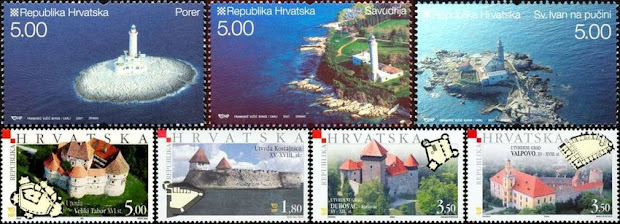When the Croatian government gave in to the demands of protesting farmers, the minister of Economic Affairs said that he would forbid the import of cheese. Long live Croatian cheese, down with Gorgonzola and Roquefort. I could also say: long live paški sir, but then few of you would know what I meant. That's the problem with Croatian products: even the handful of products that are worth exporting (and that does NOT included Cedevita) are hardly know outside of the country.
 I was seriously thinking of going to Billa (an Italian supermarket chain with branches in Croatia) to stock up cheese. But, as expected, the Croatian government had to break the promise it would forbid the import of cheese, as that is against all EU and World Trade Organization rules. Instead, it will try to raise the price of imported cheese. Same old protectionist story again: unproductive farmers receive help at the expense of ordinary citizens. Same goes for shipbuilding.
I was seriously thinking of going to Billa (an Italian supermarket chain with branches in Croatia) to stock up cheese. But, as expected, the Croatian government had to break the promise it would forbid the import of cheese, as that is against all EU and World Trade Organization rules. Instead, it will try to raise the price of imported cheese. Same old protectionist story again: unproductive farmers receive help at the expense of ordinary citizens. Same goes for shipbuilding.
The Croatian government accuses other countries of dumping cheese (damping in Croatian) and unfair competition. Sure. The grass in Western Europe in greener, people work harder and the technology is more advanced. That is why the cheese is cheaper. If we follow the government's line of argument, holidays in Croatia should be made more expensive. Croatia has a lot of sunshine and a beautiful coastline and neither of them exists because of Croatian efforts, yet Croats reap the fruits. How unfair! Camping owners in Britain, Germany and The Netherlands can't compete with the Croatian sun, so booking a holiday in Dubrovnik should be taxed.
 I was seriously thinking of going to Billa (an Italian supermarket chain with branches in Croatia) to stock up cheese. But, as expected, the Croatian government had to break the promise it would forbid the import of cheese, as that is against all EU and World Trade Organization rules. Instead, it will try to raise the price of imported cheese. Same old protectionist story again: unproductive farmers receive help at the expense of ordinary citizens. Same goes for shipbuilding.
I was seriously thinking of going to Billa (an Italian supermarket chain with branches in Croatia) to stock up cheese. But, as expected, the Croatian government had to break the promise it would forbid the import of cheese, as that is against all EU and World Trade Organization rules. Instead, it will try to raise the price of imported cheese. Same old protectionist story again: unproductive farmers receive help at the expense of ordinary citizens. Same goes for shipbuilding.The Croatian government accuses other countries of dumping cheese (damping in Croatian) and unfair competition. Sure. The grass in Western Europe in greener, people work harder and the technology is more advanced. That is why the cheese is cheaper. If we follow the government's line of argument, holidays in Croatia should be made more expensive. Croatia has a lot of sunshine and a beautiful coastline and neither of them exists because of Croatian efforts, yet Croats reap the fruits. How unfair! Camping owners in Britain, Germany and The Netherlands can't compete with the Croatian sun, so booking a holiday in Dubrovnik should be taxed.













